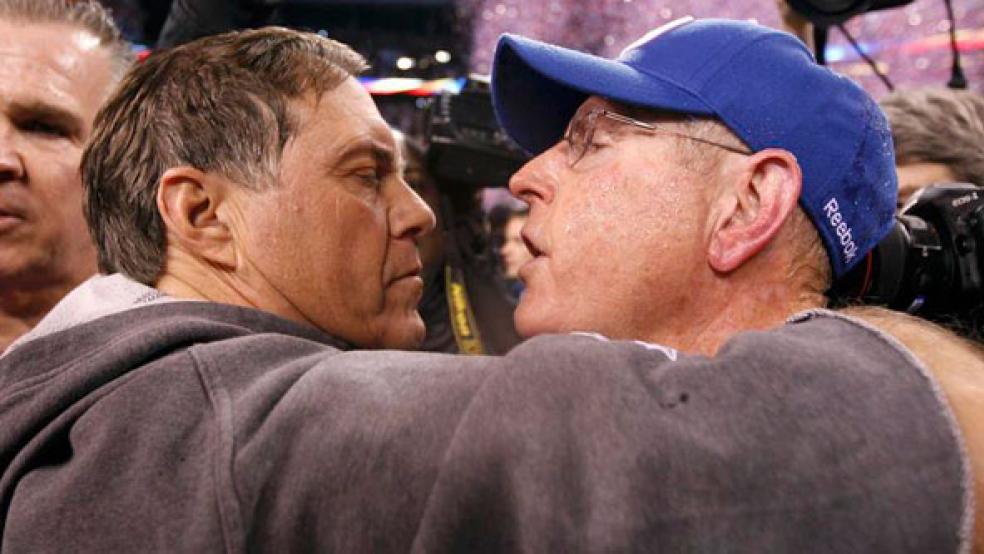Following one of the most thrilling Super Bowl games in history, the New York Giants are champions of the world. Much of the credit goes to Coach Tom Coughlin, for coming up with a game plan, getting his players ready, and getting them to execute the game plan to near perfection.
Preparing a team to play in the Super Bowl is a lot like preparing a business to compete in the marketplace. Success takes a little genius, great leadership, the ability to get the most out of every person on the payroll, and maybe a little bit of luck.
Here are the 10 things every CEO can learn from Coach Coughlin:
1. Get the most out of the talent you have. The great coaches in the NFL are the ones who are able to coax a performance from a player that exceeds his talent level. Just as Coughlin helped Victor Cruz grow from an unknown, undrafted wide receiver to become a pro Bowler, an effective CEO knows how to nurture talent, provide training, and reward performance.
2. Run a strict meritocracy. Starting spots in NFL rosters are given to players who produce. As much as an employee has produced in the past, if he no longer gets the job done, he's out. David Tyree may have helped win one Super Bowl for the Giants, but he was long gone before this one.
3. Encourage internal competition. Every football team has a depth chart. The starting quarterback knows there’s a guy right behind him who would kill for his job. Every year there’s a training camp and very few starting jobs are etched in stone. In the business world, effective leaders let their employees know that initiative will be noticed and rewarded. Promotions based on merit (not just seniority) provide incentive to every member of a team and keep everybody on their toes.
4. Spend hours scouting the competition. The way to win in football is to know the strengths, weaknesses, and tendencies of the opposition. Coughlin knew the Patriots had a weak secondary, so Eli Manning went out and completed his first 10 passes. In business, the CEO should be making a similar effort in researching the opposition. Where are they advertising? What are their best products? What are they doing on Twitter? Facebook?
5. Give underdogs an opportunity to shine. Over the course of the 2011-12 season, Coach Coughlin made a point of giving younger players playing time. When injuries happened, these players were able to step in and get the job done because they had some NFL experience under their belts. You'll never know if your your employees will be able to advance in their careers unless you give them the opportunity to take on real responsibility. Not everyone will succeed, but this creates an environment where every employee feels like a real part of the team.
Related : After the Layoff: Congrats on Your New, Worse Job
6. Plan your game meticulously. A great coach knows exactly how he wants his team to perform long before the team takes the field. He knows his team’s strengths and plots out a strategy to defeat the competition. A smart CEO plans marketing campaigns, new product launches, and customer service with the same level of precision, leaving very little to chance.
7. Get great at judging talent. In the NFL, a great draft can make or break a team. The Giants raised a lot of eyebrows when they selected the relatively obscure Jason Pierre Paul in the first round of the 2010 draft. Two Pro Bowl seasons later, nobody questions the pick. Similarly, a CEO can advance the company with a brilliant hire or set his/her company way back by making poor hires, especially at mid to senior-level positions.
8. Emphasize the team over star players. High-priced players do not guarantee success. Just ask Jets fans about that one. The Giants don’t have the best individual personnel in the NFL, but Coughlin put together a team that is better than the sum of its parts. A savvy CEO is able to get his employees to work together in a way that gets the best out of everyone, establishing internal teams and processes that create a collaborative atmosphere.
9. Master the art of bouncing back. Only once in NFL history has a team gone undefeated. No matter how great a coach you are, there will be setbacks. What separates the championship coaches from the pack is their ability to learn from the losses and to make the necessary adjustments. When the Giants were 7-7, having lost five of their last six games, everyone was calling for Coughlin to be fired. Six wins later, they are reserving a place for him in the Hall of Fame. The same is true for entrepreneurs. There will always be failures and challenges. The successful entrepreneurs are the ones willing to take risks and risks don’t always pay off. Failures, in business, can be enormously important learning tools. Figure out why an initiative didn’t work (was it the concept? The execution? A miscalculation?); then use that knowledge to succeed in the next venture.
10. Take all the luck you can get. Sometimes the difference between a Super Bowl winner and a Super Bowl loser is one quirky play. On Sunday, the Giants got away with a few fumbles because the ball bounced in the right direction. In business, a chance meeting can lead to the acquisition of a huge client. A conversation at a cocktail party can lead to the best hire you ever make. You never know when lady luck will smile on you.
Read more at Inc.com:
Which Industry Has the Worst Websites?




